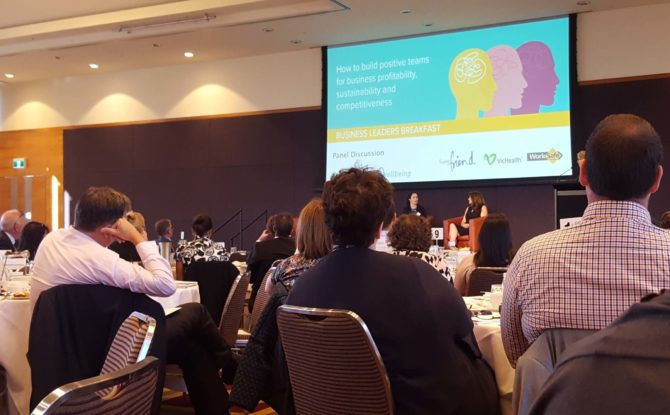
Three questions you need to ask to positively lead mental wellbeing discussions in your workplace
The Victorian Workplace Mental Wellbeing Collaboration Business Leaders Breakfast was held on 7 March 2017. We were keen to be there, so arrived promptly at 7am, with coffee in hand, of course.
Mental wellbeing is a hazard that most workplaces are nervous to engage in conversation about and as OHS professionals we definitely get that. Unlike a broken bone or laceration, a mental health injury isn’t always noticeable, which can make it hard to manage. This said, as mental health becomes better understood and more accepted as a health hazard in the community, awareness of the positive benefits associated with mental wellbeing are becoming more and more prominent in a workplace. The great thing about awareness is that it provides workplaces with an entry point to start conversations with their workers.
How would you assist a worker who came to you with a mental wellbeing issue, or advised you that they were struggling or needed support?
How to manage such a situation was one of our team’s main take-aways from this breakfast. And the good news is that once discussed in the open, it felt as easy as A, B, C.
To facilitate tangible and positive outcomes as a manager, it is crucial that rather than talk, you listen. Frame your conversation with your worker around the following three questions:
- What is it that you need to do your job and to go home every day with energy to enjoy the life you live?
- What are you going to do differently to support your wellbeing in the workplace?
- If I see that you are struggling or not performing, how would you like me to approach you? Tell me the exact words do you want me to use.
Now, more than ever, it is important for workplaces have the confidence and the skills to manage mental wellbeing issues when they arise in the workplace.
So keep these questions at hand. Practice the conversation with your peers and seniors. Get comfortable and be prepared. If you can effectively create an open and supportive space for your workers to feel confident to speak about their pressures and worries, you will have a much better chance of addressing the issue and protecting the health and safety of your workers. And this will result in positive outcomes for your worker, yourself and your business.
Over the coming months, we’ll be providing more ideas and thoughts on ways that you can improve your capability to promote and manage positive mental wellbeing in your workplace. Stay tuned for more from us.
The Leaders Breakfast was headlined by Mary Ann Baynton, Program Director for the Great West Life Centre for Mental Health in the Workplace, and Chair of the technical committee for the National Standard of Canada on Psychological Health and Safety in the Workplace.



